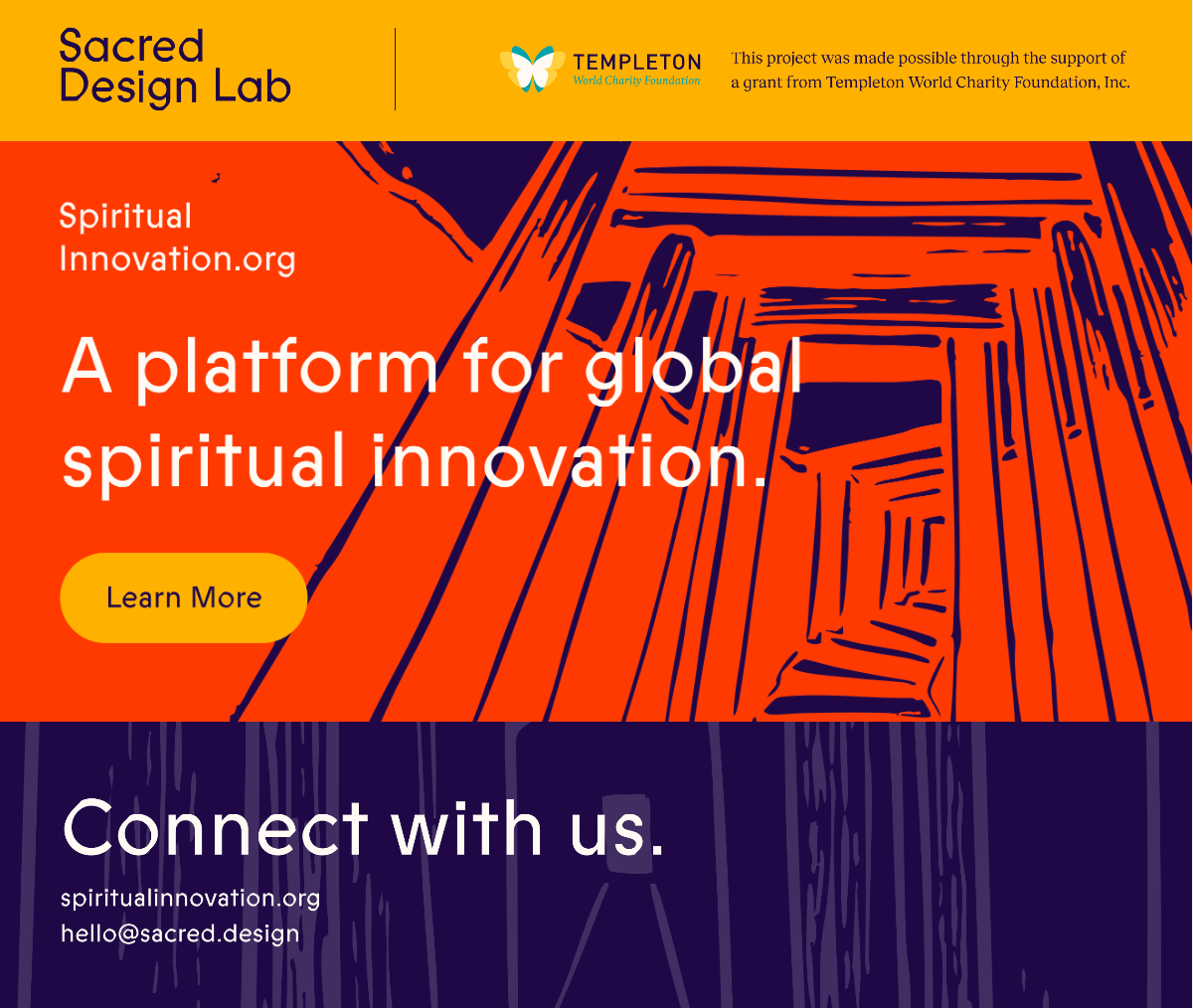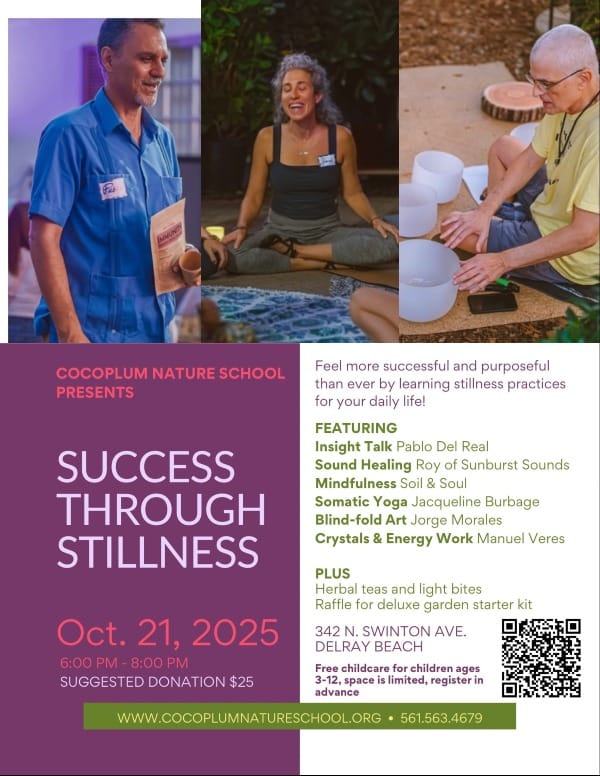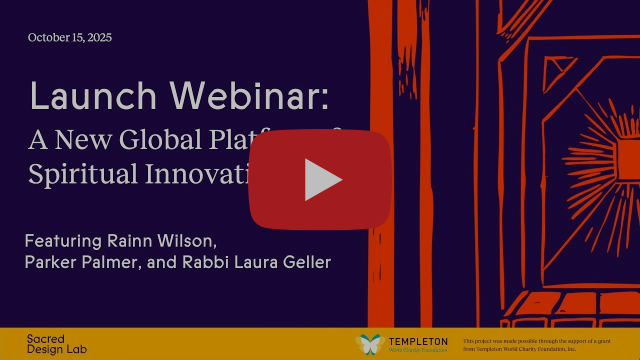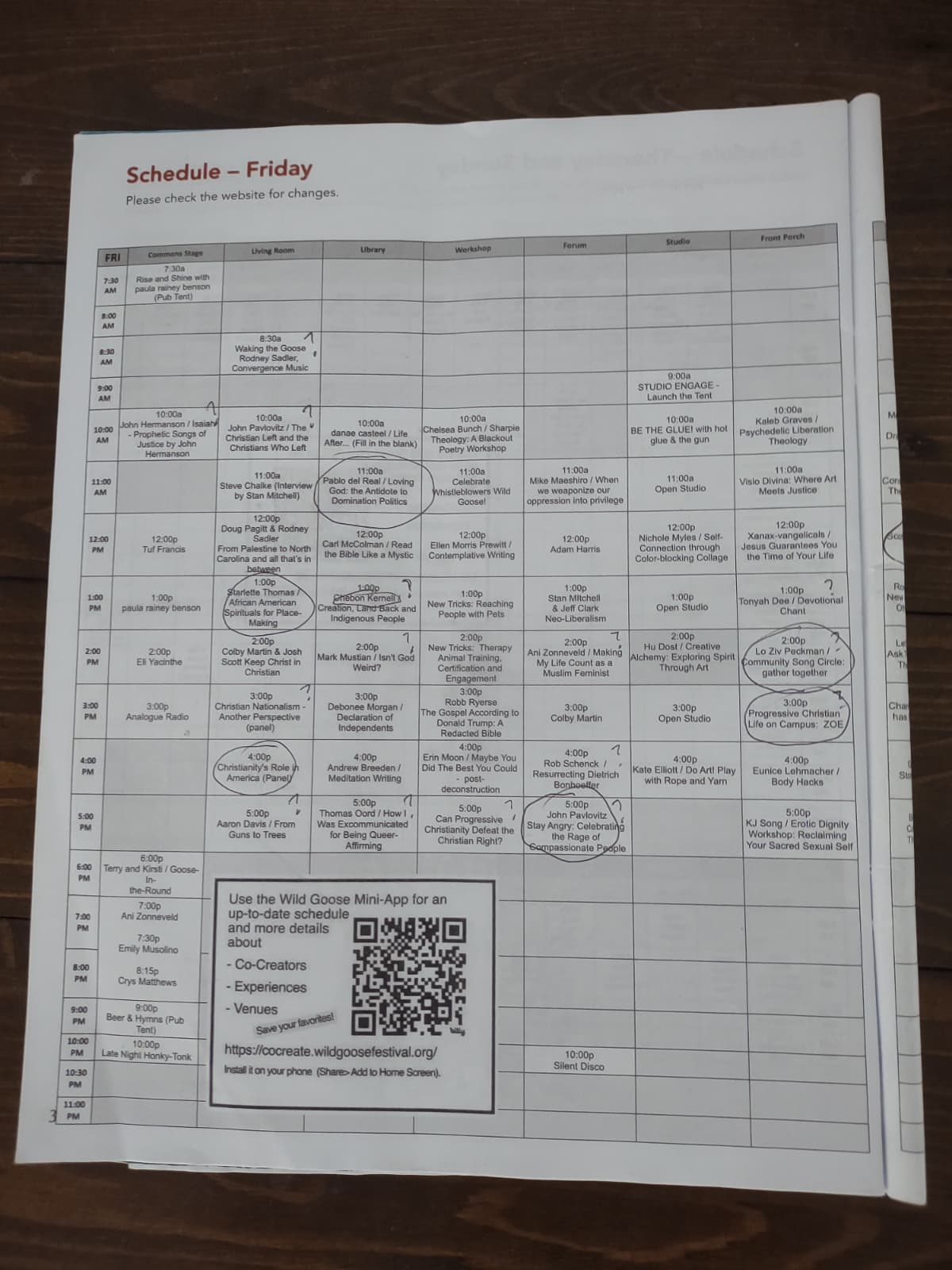Spiritual innovation & Goose #4
Riding the phase of the moon. Spiritual innovation around the world and in my own backyard. Wild Goose Festival #4: 400 sessions in 3 and a half days. The commonwealth of god.

Cosmos: First quarter moon. Sun fast (clock behind sun).
Riding the phase
The new moon was last week. I fell out of sync.
For the last several months, I’ve been observing a day of silence in the three-day window of the new moon. I’ve also been publishing an essay here in conjunction with the new moon, and with the full moon also. Last week I was not able to do either of those things, for some good reasons.
- Last Monday, October 20, was my wife’s birthday. Not a good day to go silent.
- Last Tuesday, October 21, I had to give two speeches, one at a local high school and one at Success Through Stillness, a kind of micro-Wild Goose. More about that in a minute.
- On Wednesday October 22, I had a team meeting that had been paused for weeks and couldn’t miss, nor could I participate well in silence.
So I missed my window for the day of silence and for publishing an essay here.
I rescheduled both activities for the first quarter moon. That’s today, Wednesday, October 29.

Flowing with the waves of overcommitment – plus things I can’t control – I’m riding the phase of the moon, seeing where it will take me. For now, it’s taking me to the quarter moon. How about you? Where is a connection with the phases of the moon taking you?
Spiritual innovation
On Wednesday, October 15, I caught part of the online launch of SpiritualInnovation.org, a new resource hub from Sacred Design Lab. (I caught the rest via replay later.)
I’ve been following Sacred Design Lab from a distance for a few years. Last year, I started attending some of their online gatherings.
The launch webinar this October included some impressive spiritual innovators, including younger folks, elders, and one celebrity. Some projects included in the webinar:
- Blackfullness
- Ecole de Silence (School of Silence)
- Sangha
- Soul Boom
If you want to get a sense of what spiritual innovation looks like today and what it has looked like over the last couple decades, this webinar is a great summary.

Micro-Wild Goose?
Last week, on October 21, I was invited to participate in Success Through Stillness. This was the second annual collaboration between Cocoplum Nature School and Soil & Soul, the agency I serve.
Success Through Stillness offered 6 stations for experiencing wellness-related activities. Here’s how they described it:
Visit holistic well-being stations for 15-minute mini-experiences of various stillness practices, and then carry the peace with you when you leave.
This is a great local example of spiritual innovation, a kind of micro-Wild Goose Festival, right in my backyard, so to speak. My station was Insight Talk.
The best part? One of my students, a Soil & Soul Mindfulness Club manager from a local high school, was available to partner with me. Together we shared some key insights from our respective mindfulness journeys. Hearing from a 17-year-old high school senior who started her mindfulness journey with us when she was 15 was the highlight of the event for me, and for many others, including her parents!
400 sessions in 3 and a half days
In preparing to review the Wild Goose festival, I realized just how extensive it is. There are roughly 160 sessions on each of the two main festival days: Friday and Saturday 10:00 am to 6:00 pm.
Before and after the 8-hour main schedule, there are another 20 activities combined, some earlier in the morning, others in the evening and at night.
That is to say nothing of open-ended offerings like the bookstore, the vent tent, the message wall, the sponsor events (including a variety of activities like the warm cookie parade), and the wellness tents (e.g., soul healing, massage, etc.). There is also Thursday, the pre-festival day, which this year offered a dozen full-day seminars, one of which I reviewed in the previous essay.
So from Thursday morning to Sunday midday, there are 400 things to do in 3 and a half days. Maybe now you can see why I have been slow to review it!

That is one page of a four-page schedule for Friday. A lot of decisions to be made. Studying the schedule is a quintessential sensation of the festival: choosing from so many options – up to 28 sessions per hour on main festival days – how to best invest one’s energy each hour for the next 7 hours.
Today, I’ll share just one of many highlights from Friday, the first main festival day, a highlight that intersects with on of the main themes of Love God.
The great household
On Friday evening my wife and I went to one of the food trucks near The Commons, the kind of festival hub, including picnic tables. Receiving our order and looking for a place to sit, all the tables were occupied, several of them half-full. One couple, noticing that we were holding food and looking for seats, gestured to us to join them. So we did.
This is in contrast to restaurant dining in my experience. If we had been in a self-serve restaurant or food court where all the tables were full or half-full, it’s doubtful anyone would have motioned to us to join them to have a seat at their table. This is a primary difference between capitalism and commonwealth.
The psychological foundation of capitalism is private property – you’ve got yours, and I’ve got mine. Strangers owe each other nothing outside of financial transactions, not even a seat at the table.
The psychology supporting commonwealth on the other hand is that humans occupy a single shared household for all of humanity and countless other species. Here we are. Let’s share the wealth, which, in the end, belongs to god. We owe each other love of the common good, including a seat at the table.

This conception of commonwealth is not new, not exactly. It might be a new application of the word commonwealth for laypeople. But theologians (aka lovers of god) have been using it, or something very much like it, for a long time. For example:
- The commonwealth of god – Diana Butler Bass, John Cobb, Richard Falk, David Griffin, and Catherine Keller
- Praise Be to You: on Care for our Common Home – Pope Francis
- Sabbath economics (including the great economy) – Ched Myers, Faith And Money Network, and others
Worth noting: the English word economy comes from the Greek word oikonomia, meaning household management. Of course, economy is synonymous with money these days. But that is not its original meaning.
So spiritual innovation, it turns out, often means renewing tradition, including the language of a tradition, getting back to the original intent and embodiment of a living, breathing spirituality. In other words, reinventing a spiritual way of life.
May we renew ourselves and innovate our way back to managing our common household, the commonwealth of god.

Comments ()